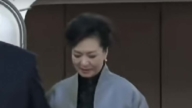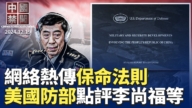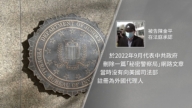【新唐人2013年02月25日訊】由於西藏的經濟環境日益改變,如今,基督教對西藏的影響,比歷史上任何時候都要大。英國《衛報》2月22號發表調查報導說,中共政府有意容忍基督教在西藏的傳播。由於中共長期以來對宗教及信仰團體實行的是打壓與迫害政策,國際社會質疑中共容忍基督教傳播的背後用心。下面請看本臺記者的報導。
據《衛報》記者喬納森•凱曼調查,約有400名外國人居住在西寧,其中多數都是傳教士。《衛報》評論說,中共政府可能歡迎基督教傳教士作為藏傳佛教的一種「反作用力」。
接受喬納森採訪的10多名人士認為,中共政府這樣做的原因,可以說用心險惡。
文章說,其中一個原因在於,傳教士是對當地經濟的福音。因為這些人要嘛從事利潤豐厚的生意,要嘛在當地學校幾乎不計報酬的教學,靠外國捐獻補貼微薄的薪酬。報導還說,中共當局在政治上信任傳教士。傳教士不願公開批評區域政策,以避免阻礙他們的精神使命。
「達賴喇嘛西藏宗教基金會」董事長達瓦才仁:「他(中共)這樣做的目地是可能想制衡藏傳佛教,因為西藏人的佛教意識很強。基督教在西藏各地都辦了很多的學校,而且只招收孤兒,讓這些孤兒和外面的世界基本上處於隔絕狀態。」
「達賴喇嘛西藏宗教基金會」董事長達瓦才仁也注意到,從政治上西藏人覺得西方會比較支持西藏,所以對這些外國人較為友好,因此,只要不批評藏傳佛教,很多基督教傳教士在西藏辦的學校還是生存了下來。
《衛報》的報導,還引述了美國「哥倫比亞大學」西藏問題專家羅比•巴尼特的話說,傳教士現象顛覆了西方對西藏的標準看法。以前西方社會有意保護正在被中共政府破壞的西藏宗教。但現在,那些在西藏的外國傳教士的目地正好相反,他們想要用自己的宗教代替西藏的宗教。
達瓦才仁:「剛開始他們講耶穌怎麼好的時候,藏人也無所謂,然後他們就開始說藏傳佛教怎麼不好的時候,藏人就覺得不舒服,所以很多就開始退學,但是這個時候中國(共)政府一般都是會保護學校。如果你辦的是藏文學校,只要稍微出點事,中國(共)政府馬上就會關閉藏文學校。而且藏文學校要有一些誦經,唸經的行為,他們就會說傳播迷信思想,他馬上就會關閉。」
1949年毛澤東宣佈西方傳教士是「精神侵略者」,並將他們驅逐出境。之後,「傳教」在中國被視為非法。但令人奇怪的是,現在中共當局對西方傳教士卻表現出「選擇性的容忍」。
達瓦才仁:「中國(共)政府還是很喜歡那種有人對藏傳佛教唱反調,不喜歡藏傳佛教的一些思想或勢力。特別是一些國外的勢力進入。中國(共)政府對他們(外國傳教士)肯定是保護的,而且這些人拒絕跟藏人談政治,甚至如果有些事情他們還是比較傾向於尋求中國(共)政府的幫忙和保護。」
近年來,為抗議中共的宗教政策,「藏人自焚事件」頻發,引起國際社會強烈譴責。2月19號,又有兩名青年藏人自焚,使得自2009年以來,青海等地自焚的藏人人數上升到104人。
華府中國問題專家章天亮:「所以說共產黨不會允許任何一個獨立的信仰存在的,不管是藏傳佛教也好,天主教,地下教會,基督教家庭教會,或者是法輪功,反正是你只要信仰,獨立於共產黨之外,共產黨他肯定是要鎮壓的。」
華府中國問題專家,「喬治梅森大學」客座教授章天亮認為,共產黨決不能容忍任何一種宗教在民間的影響力超過共產黨,即使這種有意容忍基督教在西藏的傳播,也是為了共產黨維持自己的政權,如果這種傳播一旦影響到中共政權,或者說他在民眾心目中的地位超過共產黨,共產黨一定會出手鎮壓他們。
易如/採訪 編輯/許旻 後製/蕭宇
Christianity Spread Intentionally and Tolerated in China
Today, Tibet has seen western Christians more influential
than at any time in history.
UK’s The Guardian published a report, indicating that
the Chinese Communist Party authorities intentionally tolerate the Christianity spread in Tibet.
Over decades, the CCP has been infamous for its repression
and persecution of religious and belief groups.
Thus the international community is suspicious of
the motives behind this official action.
UK’s Guardian reporter Jonathan Kaiman pointed out that
“Of the 400 foreigners living in Xining, most are missionaries.”
The article quoted interviewees’ comments that
the CCP authorities “may welcome them as a powerful
counterforce to Tibetan Buddhism”.
Kaiman interviewed over 10 people for his article.
They said that the reason for the CCP authorities’ tolerance
“ranged from pragmatic to borderline sinister.”
“One is that they are a boon to local economies – they open
lucrative businesses and teach at local schools for next to nothing,
supplementing their meager salaries with donations from home.”
Furthermore, “Authorities may also consider missionaries politically
trustworthy, reluctant to undermine their spiritual missions by openly criticizing regional policies.”
(Chairman, Tibet Religious Foundation) Dawa Tsering:
“The CCP may use it to counterbalance Tibetan Buddhism,
as Tibetans have a strong Buddhist faith.
Christian missionaries have run many schools across Tibet,
which only accept orphans.
So these orphans are living basically in a state of isolation
from the outside world.”
Dawa Tsering remarks that the Tibetans feel the
West supports Tibet politically, so they are quite friendly towards the foreigners.
He said as long as local Christian schools do not criticize
Tibetan Buddhism, they have a chance of survival.
The UK report cited Robbie Barnett,
a leading Tibet expert at Columbia University.
He said that “the missionary phenomenon overturns
the standard notion of western attitudes towards Tibet
that western society is intent on protecting Tibetan religion,
while the Chinese government is more concerned
with dismantling it."
Barnett said, “If you look at the foreigners there,
they are people whose commitment is to the opposite –
it’s to replace Tibetan religion with their own religion."
Dawa Tsering: “Incipiently, they said how good Jesus is,
the Tibetans didn’t care.
Later, when they spoke against Tibetan Buddhism,
that annoyed the Tibetans who began to drop out.
But at that stage, the CCP authorities would stand
on the side of the schools.
When similar cases came up with local Tibetan schools,
the CCP would immediately shut them down.
Local Tibetan schools have courses for
chanting Buddhist scriptures.
The CCP label it as spreading superstitions,
and close the school right away.”
Mao Zedong tagged western missionaries as “spiritual
aggressors” and deported them.
The spread of religion has been illegal in China since 1949.
However nowadays, the Chinese authorities are
“selectively tolerant” of missionaries.
Dawa Tsering: “The Chinese government likes to play the
devil’s advocate against Tibetan Buddhism.
It dislikes the thought or influences of Tibetan Buddhism,
in particular, it dislikes the inflow of foreign influence.
The CCP definitely protects those foreign missionaries,
as they don’t talk politics with local Tibetans.
On some issues, they are even inclined to seek help
and protection from the CCP authorities.”
In recent years, Tibetan self-immolations have continuously
Taken place in protest at the CCP’s religious policy.
On February 19th, two more young Tibetans self-immolated,
the figure has risen to 104 since 2009.
(Expert on China, U.S.) Zhang Tianliang: “The CCP doesn’t
really allow for the existence of any independent religion.
No matter whether it’s Tibetan Buddhism, Catholicism,
Christian Family Church or Falun Gong.
It’s a fact that the CCP represses any belief that is
independent of communist ideology.”
The CCP never tolerates any religion that has greater
influence in civil society, says Zhang Tianliang.
He indicates that the CCP is selectively tolerating the spread
of Christianity, since it does not challenge it’s rule.
Once the spread of spiritual influence affects the
regime, or interferes at the civil level,
it’s propagators and missionaries
will become crackdown victims.




























